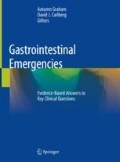Abstract
While most patients with acute pancreatitis will have a benign course with an overall mortality of 1%, a subset of patients will develop organ failure and local complications such as pancreatic necrosis or fluid collections, such as pseudocysts. These patients have a higher mortality, and the clinical tools available have limitations in identifying patients that will have a severe course of acute pancreatitis or require admission to a higher level of care. A combination of patient risk factors, lab values at admission, vital signs, imaging, and response to initial management can be used to make an individualized decision. Early research suggests patients with mild acute pancreatitis can be discharged from the emergency department.
Access this chapter
Tax calculation will be finalised at checkout
Purchases are for personal use only
References
Peery AF, Crockett SD, Barritt AS, Dellon ES, Eluri S, Gangarosa LM, et al. Burden of gastrointestinal, liver, and pancreatic diseases in the United States. Gastroenterology. 2015;149(7):1731–41.
Yadav D, Ng B, Saul M, Kennard ED. Relationship of serum pancreatic enzyme testing trends with the diagnosis of acute pancreatitis. Pancreas. 2011;40(3):383–9.
Kadiyala V, Suleiman SL, McNabb-Baltar J, Wu BU, Banks PA, Singh VK. The Atlanta classification, revised Atlanta classification, and determinant-based classification of acute pancreatitis: which is best at stratifying outcomes? Pancreas. 2016 Apr;45(4):510–5.
Banks PA, Bollen TL, Dervenis C, Gooszen HG, Johnson CD, Sarr MG, et al. Classification of acute pancreatitis--2012: revision of the Atlanta classification and definitions by international consensus. Gut. 2013;62(1):102–11.
Dellinger EP, Forsmark CE, Layer P, Levy P, Maravi-Poma E, Petrov MS, et al. Determinant-based classification of acute pancreatitis severity: an international multidisciplinary consultation. Ann Surg. 2012;256(6):875–80.
Chauhan S, Forsmark CE. The difficulty in predicting outcome in acute pancreatitis. Am J Gastroenterol. 2010;105(2):443.
Bollen TL, Singh VK, Maurer R, Repas K, Van Es HW, Banks PA, et al. A comparative evaluation of radiologic and clinical scoring systems in the early prediction of severity in acute pancreatitis. Am J Gastroenterol. 2012;107(4):612.
Lankisch PG, Weber–Dany B, Hebel K, Maisonneuve P, Lowenfels AB. The harmless acute pancreatitis score: a clinical algorithm for rapid initial stratification of nonsevere disease. Clin Gastroenterol Hepatol. 2009;7(6):702–5.
Banks PA. Acute pancreatitis: landmark studies, management decisions, and the future. Pancreas. 2016;45(5):633–40.
Kothari DJ, Hill M, Babineau M, Freedman SD, Shapiro N, Sheth S. Sa1351-management of mild acute pancreatitis through observation in the emergency department (ED): a novel clinical pathway. Gastroenterology. 2017;152(5):S287.
Ranson J. Prognostic signs and the role of operative management in acute pancreatitis. Surg Gynecol Obstet. 1974;139:69–81.
Al-Hadeedi S, Fan S, Leaper D. APACHE-II score for assessment and monitoring of acute pancreatitis. Lancet. 1989;334(8665):738.
Balthazar EJ, Robinson DL, Megibow AJ, Ranson JH. Acute pancreatitis: value of CT in establishing prognosis. Radiology. 1990;174(2):331–6.
Working Group IAP/APA Acute Pancreatitis Guidelines. IAP/APA evidence-based guidelines for the management of acute pancreatitis. Pancreatology. 2013;13(4):e1–e15.
Wu BU, Johannes RS, Sun X, Tabak Y, Conwell DL, Banks PA. The early prediction of mortality in acute pancreatitis: a large population-based study. Gut. 2008;57(12):1698–703.
Papachristou GI, Muddana V, Yadav D, O’Connell M, Sanders MK, Slivka A, et al. Comparison of BISAP, Ranson’s, APACHE-II, and CTSI scores in predicting organ failure, complications, and mortality in acute pancreatitis. Am J Gastroenterol. 2010;105(2):435.
Mounzer R, Langmead CJ, Wu BU, Evans AC, Bishehsari F, Muddana V, et al. Comparison of existing clinical scoring systems to predict persistent organ failure in patients with acute pancreatitis. Gastroenterology. 2012;142(7):1476–82.
Tenner S, Baillie J, DeWitt J, Vege SS. American College of Gastroenterology guideline: management of acute pancreatitis. Am J Gastroenterol. 2013;108(9):1400.
Brown A, Orav J, Banks PA. Hemoconcentration is an early marker for organ failure and necrotizing pancreatitis. Pancreas. 2000;20(4):367–72.
Muddana V, Whitcomb DC, Khalid A, Slivka A, Papachristou GI. Elevated serum creatinine as a marker of pancreatic necrosis in acute pancreatitis. Am J Gastroenterol. 2009;104(1):164.
Wu BU, Johannes RS, Sun X, Conwell DL, Banks PA. Early changes in blood urea nitrogen predict mortality in acute pancreatitis. Gastroenterology. 2009;137(1):129–35.
Mofidi R, Duff M, Wigmore S, Madhavan K, Garden O, Parks R. Association between early systemic inflammatory response, severity of multiorgan dysfunction and death in acute pancreatitis. Br J Surg. 2006;93(6):738–44.
Singh VK, Wu BU, Bollen TL, Repas K, Maurer R, Mortele KJ, et al. Early systemic inflammatory response syndrome is associated with severe acute pancreatitis. Clin Gastroenterol Hepatol. 2009;7(11):1247–51.
Author information
Authors and Affiliations
Editor information
Editors and Affiliations
Rights and permissions
Copyright information
© 2019 Springer Nature Switzerland AG
About this chapter
Cite this chapter
Kiechle, E.S. (2019). Risk Stratification and Disposition: What Is the Usual Course of Acute Pancreatitis? Which Patients Require a Higher Level of Care and Which Patients May Be Appropriate to Discharge?. In: Graham, A., Carlberg, D.J. (eds) Gastrointestinal Emergencies. Springer, Cham. https://doi.org/10.1007/978-3-319-98343-1_42
Download citation
DOI: https://doi.org/10.1007/978-3-319-98343-1_42
Published:
Publisher Name: Springer, Cham
Print ISBN: 978-3-319-98342-4
Online ISBN: 978-3-319-98343-1
eBook Packages: MedicineMedicine (R0)

